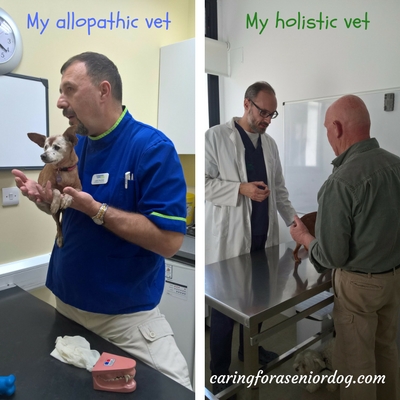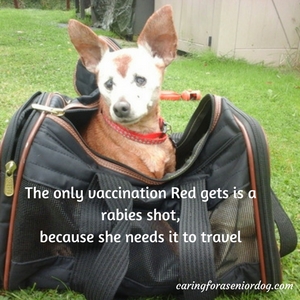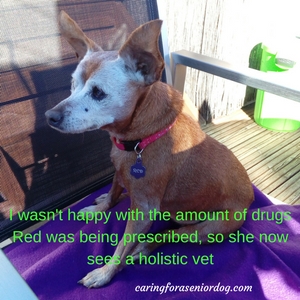
One might assume that since I am a holistic practitioner, I do not endorse allopathic veterinary care. Remember what our grade-school teachers warned about what happens when we assume, as this is simply not true.
Don’t get me wrong. I am definitely not a fan of what veterinarian Ian Billinghurst, the founder of the BARF movement, refers to as “Fake Industrial Foods,” which allopathic vet clinics peddle for top dollar as premium quality fare. Nor do I support their common practice of pushing harmful, repeated, not to mention non-mandatory vaccinations as part of the regularly scheduled annual exams. (Don’t believe me? Do your own research into findings by prominent immunologist Hugh Fudenberg, MD, and the UC Davis studies on the effects  of brain- and nerve-damaging aluminum and dendritic cell-disrupting mercury — in the form of Thimerosal, the two most common adjuvant ingredients found in vaccines, and draw your own conclusions. Then there’s the issue of ingredients including MSG, animal proteins, potential contaminants and a host of other nefarious additives. I could go on for hours, er pages!)
of brain- and nerve-damaging aluminum and dendritic cell-disrupting mercury — in the form of Thimerosal, the two most common adjuvant ingredients found in vaccines, and draw your own conclusions. Then there’s the issue of ingredients including MSG, animal proteins, potential contaminants and a host of other nefarious additives. I could go on for hours, er pages!)
As our dogs get older, their bodies in general, and their immune systems in particular have to work harder to cope with age-related challenges – some hereditary, but most a result of a lifetime spent living in the conditions of an unnatural modern-age world. Feeding ridiculously costly, carbohydrate-based, GMO-laden, protein-poor processed food full of potentially rancid fats, and synthetic vitamins and minerals adds a whopper of an unnecessary burden on these animals. Sticking them with needles that deliver toxic chemical cocktails wreaks further havoc, and unleashes a virtual cyclone of systemic chaos that can reach the dog’s deepest level: the vital force itself.
So, that said, are there instances when allopathic veterinary care may be the best choice? In my opinion, yes.
In an Emergency, West is Best
Even die-hard, holistic-only practitioners will tell you if your dog has been hit by a car, ingested a suspected poison, or is showing beginning signs of gastric torsion (AKA bloat), it is not the time to call a holistic clinic, crack open your homeopathic Materia Medica for an appropriate remedy, or, worst of all, do an Internet search asking “Dr. Google” for the best herb or supplement. Use common sense and run, don’t walk, to your nearest emergency veterinary clinic.
In these cases, surgery may be the only thing that can save your dog’s life. Sure, there will be unwanted side-effects from anesthesia, medications, and the mere trauma surrounding the circumstances, but I believe such scenarios are cases of “get help STAT and deal with the fallout later.”
Non-Emergent, Acute Cases of Mouths and Muscles
Most dentists will tell you oral health is an indicator of one’s overall state of health. Like his human guardian’s, a dog’s mouth is the gateway to the rest of his body, and deserves regular inspection and care.
Bad breath; swollen and discolored gums; and loose, abscessed or fractured teeth warrant immediate veterinary attention, as, left untreated, these conditions may lead to arthritis, and liver, kidney and even heart damage.  Unfortunately, most of these situations require a dog be sedated at best, or more likely anesthetized, in order to receive proper treatment. If teeth need to be extracted, procedures can easily cost hundreds of dollars or more, and often times the poor dog is sent home with post-op antibiotics and pain medications. Again, this is a case of help now, clean up later.
Unfortunately, most of these situations require a dog be sedated at best, or more likely anesthetized, in order to receive proper treatment. If teeth need to be extracted, procedures can easily cost hundreds of dollars or more, and often times the poor dog is sent home with post-op antibiotics and pain medications. Again, this is a case of help now, clean up later.
If your former canine athlete sustains an injury that seems more serious than the garden variety stumble or strain, a good old-fashioned X-ray or ultrasound may provide a definitive diagnosis, after which time holistic treatment options such as acupuncture, tui na (a form of soft-tissue manipulation), homeopathy or body work may be considered instead of NSAIDs, outdated recommendations of strict rest, and potent opioid painkillers.
Now that we’ve learned about these two very different approaches to veterinary care, let’s explore what’s behind Door Number Three.
Chronic Conditions Call for Combination
Some of us have senior dogs who are in pretty good shape, and don’t really need a lot of medical care. For these fortunate fellows, why not seek the help of an integrative veterinarian?
They’re really not so hard to find these days. Many vets are willing to offer natural alternatives to the standard components of the multi-faceted Senior Wellness Package.
For example, it really wouldn’t hurt to have your dog’s vet perform the blood and urine tests, but it seems silly to subject your dog to harsh de-worming agents when it’s so easy and non-invasive to run a fecal exam to determine if it’s even necessary in the first place.
While we’re talking about parasites, why not forego the traditional topical, or worse, oral flea and tick products that not only poison your dog, but also the environment; and roll up your sleeves, mow your lawn, sprinkle it with  some non-toxic (except to the fleas and ticks!) diatomaceous earth or cedar pellets, and attach a Shoo Tag or ultrasonic medallion to your dog’s collar to keep the bugs at bay.
some non-toxic (except to the fleas and ticks!) diatomaceous earth or cedar pellets, and attach a Shoo Tag or ultrasonic medallion to your dog’s collar to keep the bugs at bay.
If your dog has arthritis, an integrative vet can offer herbal or food-based joint supplements that actually treat the condition, rather than suppress or palliate the symptoms.
Finally, don’t forget the diet! No dog would object if you offered to feed his joints with treats like bovine trachea, chicken or pigs’ feet, and delicious bone broth – all rich in elastin, collagen, glucosamine and chondroitin. If your dog has tender teeth, these offerings can double as safe, fully digestible recreational bones so he can get his gnaw on without incident. Bone appétit!
This post was kindly written by Dr, Reema Sayegh. She holds doctoral degrees in Holistic Nutrition and Naturopathy, and has over 20 years experience in the field of integrative medicine and holistic health. After she rescued a nine-year-old Great Dane mix named Zeus in 2004, Dr. Reema was inspired to “shift gears” and has since become a Reiki master teacher, certified holistic pet consultant, published author, public speaker, and animal welfare advocate. She works in tandem with veterinarians and their clients to provide companion animals adjunct natural wellness modalities, and, when indicated, specialty geriatric and hospice care. Dr. Reema resides in California with her husband and the love of their lives: a spirited canine teacher, healer, and gigantic, fun-loving goofball named Dakota. She can be reached at drreema4pets@yahoo.com.

 What Questions to Ask a Vet About Your Senior Dog
What Questions to Ask a Vet About Your Senior Dog
This is interesting. I haven’t had a reason to look for a holistic vet because, luckily, my girls are healthy. But I would definitely consider it. I would hope both vets would work together.
I’ve never had a holistic vet as my “regular” vet but many people do. It would be interesting to see how they approach health care – if they recommend supplements and the like to healthy animals, as a way to keep them healthier longer. It’s definitely possible to see both, but you’d really have to stay on top of them to make sure they communicate and everyone’s notes are up to date. That would be so much easier if they were part of the same practice.
Great post, Layla is getting on slowly, 10+ and I am watching her carefully. Her teeth phew are good, actually in general she is in good health and I have started doing twice a year check ups also. My vet is great when I argue about medications etc and really shocked me the other day when he said to give her probiotics for an upset tummy instead of jumping on the medicine train and they worked. I cook for her and always will and add to her food an amazing dehydrated food which has turmeric, hemp hearts, blueberries etc in so her diet is very balanced, the vet was impressed with that food LOL.
Layla wears a preventative tag against bugs, its now one year and she has been bug free, plus I clean the house etc with apple cider vinegar, no chemicals of any kind in our house where possible.
So hopefully I am on the right track
Wow you’re amazing, and Layla is lucky to have you taking such good care of her, and her environment. It’s great to hear your vet suggested a natural supplement instead of turning to drugs right away. That’s the problem I have with my vet in England. He’s so amazing, and has done such an incredible job helping me keep Red well, but it’s all drugs and prescription diet foods which I’m not happy about. I’m familiar with using vinegar but not apple cider vinegar. I bought a big bottle recently thinking I would use it in a recipe, I haven’t even opened it so perhaps it will be my new cleaning product instead.
I’m so lucky to have an amazing team of veterinarians who happily and productively work together to support my pets health, despite their varied allopathic and holistic focuses. There is a group email that goes out after every visit with each practitioner (or our physiotherapist), so everyone is up-to-date and we share non-emergency treatment plans with the group before putting them into use. Yes, I pay a little more for this service, but I am lucky to be able to afford that option and, as such, to give my boys the best of both worlds.
Wow Jodi that sounds like an amazing practice. I would love to have that balance in one veterinary office, unfortunately my vet’s practice in the UK doesn’t offer a holistic element. I would have to travel further than I’m able to find a holistic vet, and then I’d have to rely on them communicating. I know it would never work, and Red is the one who suffers. Wouldn’t it be helpful if there were more options like yours?